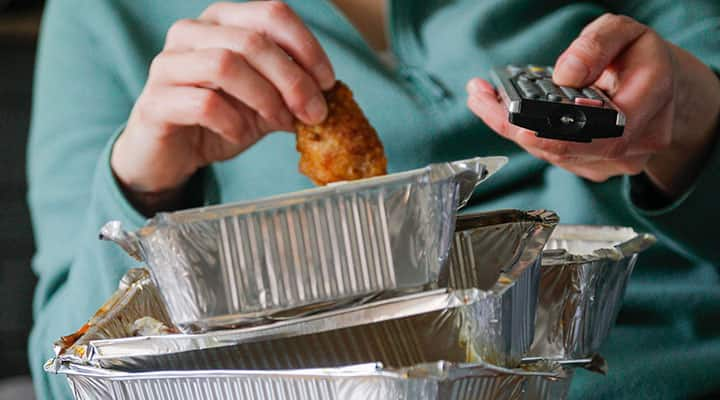
Why Does Food Noise Make Me Eat More?
Published: June 2025
The constant mental chatter about food—what to eat, when to eat, how much to eat—is known as "food noise," and it might be influencing your eating habits more than you realize.
This term has gained traction in recent years, especially with the increase in awareness of glucagon-like peptides (GLP). But it's not a new phenomenon. If you've ever found yourself distracted by a constant stream of food thoughts that take up too much mental space (should you really be daydreaming of dinner at lunchtime?) or cravings that tempt you to make dietary choices you later regret, you may be dealing with the effects of food noise as well.
Why is it so pervasive? Let's look at the science. Food noise is more than just a wandering mind; it's linked to a biological phenomenon called food cue reactivity. This is how your brain responds to food-related triggers like smells, sights, emotions or even time of day. And when food noise is turned up high, it becomes harder to resist temptation or stick to healthy eating goals.
Food noise can be detrimental mentally and physically, playing a role in our health and eating habits that might lead to less healthy choices over time that add up.
Let's break down what food noise really is, how it impacts your body and brain, and what you can do to help quiet it. In turn, you might feel more in control around food and finally give your mind some peace.
What is food noise?
Food noise isn't an official medical term, but experts and individuals alike are starting to describe it as a steady stream of thoughts about food that just won't turn off.
It's like a radio station in your brain that only plays food ads. As a result, making healthy choices with food becomes increasingly difficult. Food noise can be triggered by things like the sight or smell of food, ads, or even background noise during meals.
These cues activate the brain's reward system, increasing food cravings and prompting eating—even when you're not actually hungry.
Here are some daily examples of food noise:
- Thinking about what you'll eat for your next meal while still eating your current one.
- Feeling tempted every time you see or smell food—even when you're not physically hungry.
- Getting distracted by thoughts of snacks or cravings throughout the day.
- Noticing your mood shift every time you scroll past food content on social media.
How does food noise affect our eating habits?
To understand how food noise affects eating, imagine your brain is like a computer. Every time a food cue pops up—whether it's the smell of popcorn or a picture of pizza on Instagram—it sends a notification to your brain.
For some people, these notifications are just background noise that don't impact their appetite. For others, they take over the whole screen. Here are a few of the most common ways that food noise impacts our eating habits.
1. Eating when you're not hungry
Food noise often starts with what we see, smell or hear. These cues trigger areas of the brain linked to reward and motivation—essentially lighting up your brain like a pinball machine. When you're exposed to food-related stimuli, even something as simple as the smell of popcorn or a picture of a burger, your brain reacts as if you're about to eat it. This reaction can cause cravings to spike, leading to snacking or overeating even when you're not physically hungry. It's less about need and more about the brain being tempted into action.
2. Having "mouth hunger" vs. "stomach hunger"
Not all hunger comes from an empty stomach. Hedonic hunger is driven by pleasures derived from the taste, texture, or comfort of food rather than the body's energy needs. Unlike homeostatic hunger (which helps keep your body fueled), hedonic hunger pushes you to eat because it feels good. This type of hunger can override fullness cues, making it easy to reach for dessert after a big meal or snack out of boredom, stress or habit. The result? You end up eating more than your body actually needs.
If you've ever felt uncomfortably full after a meal out at a restaurant, only to receive the dessert menu and suddenly have room for your sweet treat, you've experienced this phenomenon.
3. Feeling overwhelmed
Our brains have a built-in reward system that distinguishes between "liking" food and "wanting" it. You might enjoy the taste of something (liking), but you can also be powerfully driven to get it (wanting)—even if you're not hungry.
This is where the limbic system comes into play. In some people, the "wanting" pathway becomes overactive, fueling strong food urges. It's why you might find yourself reaching for a snack simply because the desire to eat feels overwhelming. And, if you've been otherwise focused on nutrition and portion control, food urges can sabotage those goals, which in turn can make you feel disappointed in yourself.
4. When food noise is due to actual noise
Believe it or not, the noise level in your environment can influence how much you eat. Research shows that loud or distracting environments like restaurants, parties, or even watching TV while eating, can increase emotional arousal and reduce awareness of how full you feel.
These settings put a heavier cognitive load on your brain, which can lead to more impulsive food decisions. Plus, background noise can alter how much you enjoy your food, sometimes causing you to eat more to chase that same level of satisfaction.
Can food noise be controlled?
Yes! Part of the reason food noise feels so constant is because our modern world is filled with food cues. Everywhere you turn, there's a commercial, a snack table, or an office fridge calling your name.
However, one thing we've learned from a subset of the population is that modification of glucagon-like peptides (GLP) activity can alter appetite through a variety of ways, including signals in the brain that tell people to eat, which get a lot quieter. This tells us that food noise isn't just about willpower—it's also about biology. You can change your brain to respond differently to food cues.
Explore Our Best Weight Management Supplements
How to reduce food noise
Here are three science-backed ways to quiet food noise:
1. Mindfulness training
Mindfulness is the practice of paying full attention to the present moment—on purpose and without judgment. When it comes to eating, mindfulness means slowing down, tuning into your body's hunger and fullness cues, and truly experiencing your food with all your senses.
Think of it like turning off autopilot. Instead of rushing through a meal while scrolling on your phone, mindfulness invites you to sit, chew slowly, notice flavors, and listen to your body's signals.
According to a recent study, people who practiced food-related mindfulness over a 31-day period experienced a reduced habituation response to food cues—that's a fancy way of saying their brains stopped reacting so strongly to constant food stimuli.
In other words, mindfulness helped participants notice food cues without automatically reacting to them. This led to more satisfying meals and less overeating since they were able to enjoy their food without being hijacked by cravings or emotional triggers.
How to Practice Mindful Eating:
Start with a pause:
Before eating, take a few deep breaths and check in with your body—are you hungry, or just bored or stressed?Engage your senses:
Notice the colors, smells, and textures of your food before taking a bite.Chew slowly:
Put your fork down between bites and really taste each one.Check in halfway:
Ask yourself if you're still hungry or starting to feel satisfied.
2. Cognitive regulation techniques
Cognitive regulation is a fancy term for using intentional, thoughtful strategies to manage your emotional or behavioral responses—in this case, to food. Instead of telling yourself, "Don't eat that," try reframing your thoughts. Ask, "How will this food make me feel later?" This mental shift activates the part of your brain responsible for long-term thinking, helping you make better decisions that align with your goals.
Food noise thrives on impulsive thinking—it's that mental nudge that makes you reach for chips even though you're not hungry. But research shows that using cognitive regulation techniques can reduce food cravings and improve decision-making, even when you're surrounded by tempting cues or distractions.
By tapping into the part of your brain that focuses on long-term outcomes, you can create space between a craving and your reaction. This helps you respond rather than react—and that small shift can make a big difference when it comes to managing food noise and sticking to your goals.
3. Environmental modifications
Environmental modifications are simple and practical changes you can make to your surroundings to help support healthier eating habits. Think of them as the food version of noise-canceling headphones; they can help block out distractions and temptations so you can focus on what your body actually needs.
Research shows that loud environments and constant exposure to food cues (like ads or open snack cabinets) can increase emotional arousal and stress, which in turn makes it harder to resist cravings. Even something as simple as background noise during a meal can lead to more impulsive eating decisions and less awareness of fullness.
When your environment is full of tempting sights, smells, and sounds, your brain stays on high alert for food. But when you reduce those cues, food noise starts to fade into the background.
Tips for Modifying Your Eating Environment
Keep tempting foods out of sight:
If you see it, you'll think about it—so store snacks in opaque containers or higher-up cabinets.Lower ambient noise:
Turn off the TV or loud music during meals to help your brain stay focused on eating meals and snacks.Avoid screens while eating:
Watching TV or scrolling can distract you from recognizing fullness.Don't shop hungry:
Going to the grocery store on an empty stomach makes it harder to resist impulse buys.Use smaller plates or bowls:
This visual trick can help with portion control and reduce overeating.
Can supplements help curb your appetite?
If you're looking for additional support, certain supplements may help manage food cravings and support appetite control. One of the most promising is saffron.
Saffron extract has been studied for its ability to support emotional well-being and reduce snacking, especially in response to stress. By supporting mood and reducing emotional eating, saffron may help you feel more in control between meals.
Summary: Stay in tune with your body and mind
As a takeaway, the following practices will help you combat food noise and keep your eye on the ultimate prize, your good health:
Mindful eating:
Slow down and fully focus on your meals. Tune in to your hunger and fullness cues. Research shows mindfulness training can reduce overeating and increase meal satisfaction.Cognitive reframing:
Ask yourself, "How will I feel after I eat this?" Think about your long-term goals rather than short-term gratification. Remember that a "later" mindset has been shown to significantly reduce cravings.Modify your environment:
Eat in quiet, low-distraction settings. Avoid screens and loud noise during meals. Keep tempting foods out of sight and limit exposure to food ads.Combine techniques for better results:
Mindfulness plus slow, deliberate chewing can enhance feelings of fullness and reduce cravings. Research shows this combination supports weight loss and more intuitive eating.Consider supplements:
Certain weight management supplements can help with food noise. Combine them with these practices, a healthy diet and regular exercise for the best results.
Food noise can feel overwhelming—but it doesn't have to be a permanent reality for you. By understanding what causes this constant mental chatter and using tools like mindfulness, cognitive reframing, and supportive supplements, you can help quiet the noise and tune back in to your body.
You don't have to rely on willpower alone. With a little practice, you can turn down the volume and reclaim your peace of mind.
Ready to get started? Take our weight management quiz to find the right support for your goals.
About the Author: With over 10 years of experience in nutrition, Caroline Thomason is a media dietitian in the greater Washington, DC area. As a dietitian, she is the best at breaking down science-based information in an easy-to-digest way for consumers and healthcare professionals alike. In her private practice, she works with women who want to stop dieting and find confidence with food.
References
- Bilman E, et al. "External cues challenging the internal appetite control system-Overview and practical implications." Crit Rev Food Sci Nutr. September 2017. https://pubmed.ncbi.nlm.nih.gov/26463499/
- Demos McDermott KE, et al. "Effects of Cognitive Strategies on Neural Food Cue Reactivity in Adults with Overweight/Obesity." Obesity (Silver Spring). October 2019. https://pubmed.ncbi.nlm.nih.gov/31411800/
- Diktas HE, et al. "Development and validation of the Food Noise Questionnaire." Obesity (Silver Spring). January 2025. https://pmc.ncbi.nlm.nih.gov/articles/PMC11774004/
- Fasano A. "The Physiology of Hunger." N Engl J Med. January 2025. https://pubmed.ncbi.nlm.nih.gov/39842012/
- Forcano L, et al. "Cognitive and neuromodulation strategies for unhealthy eating and obesity: Systematic review and discussion of neurocognitive mechanisms." Neurosci Biobehav Rev. April 2018. https://pubmed.ncbi.nlm.nih.gov/29432784/
- Hayashi D, et al. "What Is Food Noise? A Conceptual Model of Food Cue Reactivity." Nutrients. November 2023. https://pubmed.ncbi.nlm.nih.gov/38004203/
- Kanoski SE, Boutelle KN. "Food cue reactivity: Neurobiological and behavioral underpinnings." Rev Endocr Metab Disord. August 2022. https://pubmed.ncbi.nlm.nih.gov/35482137/
- Mathiesen SL, et al. "The sound of silence: Presence and absence of sound affects meal duration and hedonic eating experience." Appetite. July 2022. https://pubmed.ncbi.nlm.nih.gov/35337885/
- Morales I, Berridge KC. "'Liking' and 'wanting' in eating and food reward: Brain mechanisms and clinical implications." Physiol Behav. December 2020. https://pubmed.ncbi.nlm.nih.gov/32846152/
- Peng-Li D, et al. "'Sound' Decisions: The Combined Role of Ambient Noise and Cognitive Regulation on the Neurophysiology of Food Cravings." Front Neurosci. February 2022. https://pubmed.ncbi.nlm.nih.gov/35250463/
- Schnepper R, et al. "A combined mindfulness-prolonged chewing intervention reduces body weight, food craving, and emotional eating." J Consult Clin Psychol. January 2019. https://pubmed.ncbi.nlm.nih.gov/30570305/
- Stroebele N, De Castro JM. "Effect of ambience on food intake and food choice." Nutrition. September 2004. https://pubmed.ncbi.nlm.nih.gov/15325695/
- Torske A, et al. "Mindfulness training decreases the habituation response to persistent food stimulation." Sci Rep. April 2025. https://pubmed.ncbi.nlm.nih.gov/40280994/
Always be in the know!
Access the latest deals, wellness news, expert health tips & more!













